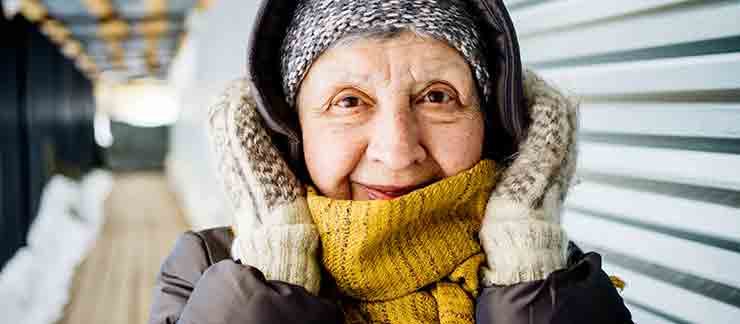
Common Winter Hazards Among the Elderly
When you think of winter, you probably think about the holidays, taking time off work, enjoying winter sports, or visiting with family. If you care for aging loved ones, winter might make you also dwell on common cold-weather hazards that impact the elderly.
Here are some hazards you should know about — and suggestions for how you can keep your loved one safe:
Cold Temperatures
As the temperature outside drops, the risk of hypothermia rises. Hypothermia is caused by prolonged exposure to the cold, which results in the body losing heat faster.
Seniors are at higher risk of developing hypothermia than younger people because the ability to regulate body temperature decreases with age. Suppose your loved one needs dementia care or has other cognitive issues. In that case, they may be at an even higher risk of hypothermia — especially if they have difficulty communicating or tend to wander outdoors.
Warning signs of hypothermia include:
- Shivering
- Exhaustion
- Confusion
- Loss of dexterity
- Memory loss
As body temperature drops, brain function slows, so older adults are also unlikely to realize they are experiencing symptoms — making hypothermia even more dangerous. If you suspect hypothermia, seek emergency medical help by dialing 911 or going to the nearest hospital emergency room.
Seven Tips for Winter Survival
Keeping your elder warm through winter is essential, so consider doing the following:
- Make sure your loved one is dressing appropriately for the weather.
- Check your loved one’s home for drafts and seal up problematic windows or doors.
- Avoid using space heaters, which can become fire and tripping hazards.
- Ensure your loved one’s heating system is working correctly and they are paying their heating bills. Living in a cold house is a significant risk factor for hypothermia in older adults.
- Have blankets and warm clothing available.
- Make sure your loved one is eating enough. Food is required to create energy the body needs to produce heat.
- Check on your senior frequently (or ask another trusted adult to check on them) to ensure they are comfortable.
Ice and Snow
According to the U.S. Centers for Disease Control and Prevention (CDC), one in four seniors falls annually, leading to 3 million emergency room visits and more than 800,000 hospitalizations. When the ground is covered with snow and ice, the risk of falling for seniors becomes even higher — and falls, whether indoors or outdoors, can result in broken bones, head injuries, loss of independence, isolation, fear of a future fall, or even death.
Here’s how you can reduce your loved one’s fall risk during the winter:
- Have someone clear a path to the front door, mailbox, outdoor trash cans, and other outdoor areas your loved one needs to access.
- Make sure your loved one is wearing sensible shoes with non-slip soles and using mobility aids if necessary.
- Encourage your loved one not to venture outdoors if conditions are bad unless there is an emergency.
- Clean up indoor puddles caused by melting snow and ice tracked in on someone’s shoes.
- Encourage visitors to leave their shoes at the front door.
- Ensure that the house is well-lit on darker winter days.
Cold and Flu
As winter rolls around, so does cold and flu season. According to the CDC, seniors are at higher risk of catching diseases and are more likely to experience severe complications due to age-related immune system deficiencies. Ask your loved one’s doctor if they recommend vaccines for flu, pneumonia, or COVID-19. Other preventative measures include:
- Washing hands regularly
- Asking others to cover their coughs or sneezes
- Avoiding people who are sick
- Avoiding crowded events or areas, especially during times of high community spread
- Avoiding touching your eyes, mouth, nose, or face
- Disinfecting frequently touched surfaces in the home, especially if someone in the home is ill
- Practicing good health habits, such as eating healthy, drinking plenty of fluids, managing stress, getting adequate sleep, and exercising
Consider Whether a Professional Caregiver Could Help
With the increased risks associated with winter weather, having someone check in on your loved one regularly is critical. However, if family and friends are not nearby, a professional caregiver can visit your loved one as often as needed to monitor the temperature in the house and help your loved one to dress in warm, appropriate clothes.
An in-home personal caregiver will provide your elderly loved one with companionship, prevent isolation and supervise trips outside the house — providing you with peace of mind, even when you can’t be there.
Learn more through a free home care consultation. Contact your nearest home care office today!
